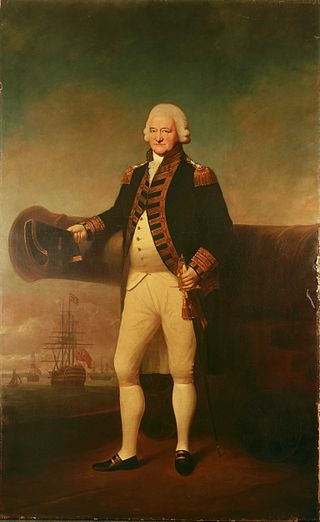
Admiral of the Fleet Sir Peter Parker, 1st Baronet was a Royal Navy officer. As a junior officer, he was deployed with a squadron under Admiral Edward Vernon to the West Indies at the start of the War of Jenkins' Ear. He saw action again at the Battle of Toulon during the War of the Austrian Succession. As captain of the fourth-rate HMS Bristol he took part in the Invasion of Guadeloupe during the Seven Years' War.

Admiral of the Fleet Sir Chaloner Ogle KB was a Royal Navy officer and politician. After serving as a junior officer during the Nine Years' War, a ship he was commanding was captured by three French ships off Ostend in July 1706 in an action during the War of the Spanish Succession. Ogle was given command of the fourth-rate HMS Swallow and saw action against the pirate fleet of Bartholomew Roberts in the Battle of Cape Lopez in February 1722. The action was to prove a turning point in the war against the pirates and many consider the death of Roberts to mark the end of the Golden Age of Piracy.
Admiral The Hon. George Townshend was a British naval commander.

Vice-Admiral Sir Joshua Rowley, 1st Baronet was a Royal Navy officer who was the fourth son of Admiral Sir William Rowley. Sir Joshua was from an ancient English family, originating in Staffordshire (England) and was born on 1 May 1734. Rowley served with distinction in a number of battles throughout his career and was highly praised by his contemporaries. Unfortunately whilst his career was often active he did not have the opportunity to command any significant engagements and always followed rather than led. His achievements have therefore been eclipsed by his contemporaries such as Keppel, Hawke, Howe and Rodney. Rowley however remains one of the stalwart commanders of the wooden walls that kept Britain safe for so long.

Admiral Sir Charles Rowley was a Royal Navy officer who went on to be Commander-in-Chief, Portsmouth.

Admiral Sir Edward William Campbell Rich Owen GCB GCH was a Royal Navy officer who went on to be Commander-in-Chief, Mediterranean Fleet. He was the son of Captain William Owen and elder brother of Vice-Admiral William Fitzwilliam Owen.
Vice-Admiral James Gambier (1723–1789) was a Royal Navy officer who went on to be Commander-in-Chief, North American Station. The historian David Syrett presented a study of Gambier, which presented him as corrupt and largely disliked by his fellow officers.
Sir William Burnaby, 1st Baronet was a British naval officer who became Commander-in-Chief, Jamaica Station.
Admiral Robert Montagu was a Royal Navy officer who became Commander-in-Chief of the Jamaica Station.
Vice-Admiral John Ford was a Royal Navy officer who served as Commander-in-Chief of the Jamaica Station.
Rear-Admiral Alexander Innes was a Royal Navy officer who became Commander-in-Chief of the Jamaica Station.
Vice-Admiral John Pakenham (1743–1807) was a Royal Navy officer who became Commander-in-Chief of the Jamaica Station.

Admiral William Parry was a Royal Navy officer who served as Commander-in-Chief of the Jamaica Station.

Captain Digby Dent was a Royal Navy officer who served as Commander-in-Chief of the Jamaica Station.
Captain Cornelius Mitchell was a Royal Navy officer who served as Commander-in-Chief of the Jamaica Station.

Vice-Admiral Thomas Davers was a Royal Navy officer who served as Commander-in-Chief of the Jamaica Station.
Captain Digby Dent (1682–1737) was a Royal Navy officer who served as Commander-in-Chief of the Jamaica Station.
Rear Admiral William Smith was a Royal Navy officer who served as Commander-in-Chief of the Jamaica Station.
Rear Admiral Edward St. Lo was a Royal Navy officer who served as Commander-in-Chief of the Jamaica Station. He may have been the son of the Commissioner of the Navy, George St. Lo.
Vice Admiral James Littleton (1668–1723) was a Royal Navy officer who served as Commander-in-Chief of the Jamaica Station.








